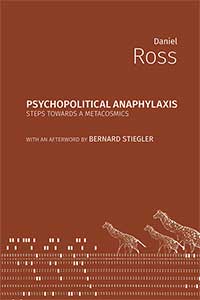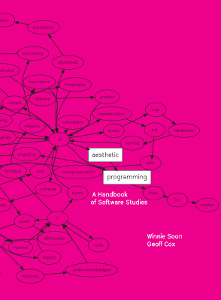Psychopolitical Anaphylaxis: Steps Towards a Metacosmics - new book from Open Humanities Press
 Monday, February 22, 2021 at 3:08PM
Monday, February 22, 2021 at 3:08PM Announcing the publication of Psychopolitical Anaphylaxis: Steps Towards a Metacosmics by Daniel Ross.
Like all Open Humanities Press books, Psychopolitical Anaphylaxis is available for free:
http://www.openhumanitiespress.org/books/titles/psychopolitical-anaphylaxis/
 The great acceleration that has become known as the Anthropocene has brought with it destructive consequences that threaten to give rise to a dangerous and potentially explosive convergent reaching of limits, not just climatically or biospherically, but psychosocially. This convergence demands a new kind of thinking and a reconsideration of fundamental philosophical, political and economic theory in light especially of the age of computational capitalism, in order to prevent this convergence from becoming absolutely catastrophic. The French philosopher Bernard Stiegler argued that the basis for such a reconsideration must be, in a very general way, the thought of entropy. Psychopolitical Anaphylaxis examines, draws on, and dialogues with Stiegler’s work, and aims to take steps towards this new kind of thinking. Borrowing also from Georges Canguilhem and Peter Sloterdijk, among others, it argues as well for an immunological perspective that sees psychopolitical convulsions as a kind of anaphylactic shock that threatens to prove fatal. The paradox that must ultimately be confronted in the Anthropocene conceived as an Entropocene is the contradiction between the urgent need for a global emergency procedure and the equally necessary task of finding the time to carefully rethink our way beyond this anaphylaxis. The task of thinking today must be to inhabit this paradox and make it the basis of a new dynamic.
The great acceleration that has become known as the Anthropocene has brought with it destructive consequences that threaten to give rise to a dangerous and potentially explosive convergent reaching of limits, not just climatically or biospherically, but psychosocially. This convergence demands a new kind of thinking and a reconsideration of fundamental philosophical, political and economic theory in light especially of the age of computational capitalism, in order to prevent this convergence from becoming absolutely catastrophic. The French philosopher Bernard Stiegler argued that the basis for such a reconsideration must be, in a very general way, the thought of entropy. Psychopolitical Anaphylaxis examines, draws on, and dialogues with Stiegler’s work, and aims to take steps towards this new kind of thinking. Borrowing also from Georges Canguilhem and Peter Sloterdijk, among others, it argues as well for an immunological perspective that sees psychopolitical convulsions as a kind of anaphylactic shock that threatens to prove fatal. The paradox that must ultimately be confronted in the Anthropocene conceived as an Entropocene is the contradiction between the urgent need for a global emergency procedure and the equally necessary task of finding the time to carefully rethink our way beyond this anaphylaxis. The task of thinking today must be to inhabit this paradox and make it the basis of a new dynamic.
Author bio
Daniel Ross has translated numerous books by Bernard Stiegler, including most recently Nanjing Lectures 2016-2019 (Open Humanities Press) and The Age of Disruption: Technology and Madness in Computational Capitalism (Polity Press). With David Barison, he is the co-director of the award-winning philosophical documentary, The Ister, which premiered at the Rotterdam Film Festival and was the recipient of the Prix du Groupement National des Cinémas de Recherche (GNCR) and the Prix de l’AQCC at the Festival du Nouveau Cinéma, Montreal (2004). He is the author of Violent Democracy (Cambridge University Press, 2004) and many articles and book chapters on the work of Bernard Stiegler.
 Gary Hall | Comments Off |
Gary Hall | Comments Off | 






